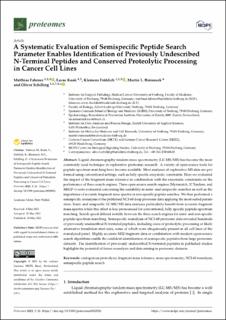Please use this identifier to cite or link to this item:
https://doi.org/10.21256/zhaw-25894| Publication type: | Article in scientific journal |
| Type of review: | Peer review (publication) |
| Title: | A systematic evaluation of semispecific peptide search parameter enables identification of previously undescribed N-terminal peptides and conserved proteolytic processing in cancer cell lines |
| Authors: | Fahrner, Matthias Kook, Lucas Fröhlich, Klemens Biniossek, Martin L. Schilling, Oliver |
| et. al: | No |
| DOI: | 10.3390/proteomes9020026 10.21256/zhaw-25894 |
| Published in: | Proteomes |
| Volume(Issue): | 9 |
| Issue: | 2 |
| Page(s): | 26 |
| Issue Date: | 2021 |
| Publisher / Ed. Institution: | MDPI |
| ISSN: | 2227-7382 |
| Language: | English |
| Subjects: | NCI-60 reanalysis; Endogenous proteolysis; Fragment mass tolerance; Mass spectrometry; Semispecific peptide search |
| Subject (DDC): | 572: Biochemistry |
| Abstract: | Liquid chromatography-tandem mass spectrometry (LC-MS/MS) has become the most commonly used technique in explorative proteomic research. A variety of open-source tools for peptide-spectrum matching have become available. Most analyses of explorative MS data are performed using conventional settings, such as fully specific enzymatic constraints. Here we evaluated the impact of the fragment mass tolerance in combination with the enzymatic constraints on the performance of three search engines. Three open-source search engines (Myrimatch, X! Tandem, and MSGF+) were evaluated concerning the suitability in semi- and unspecific searches as well as the importance of accurate fragment mass spectra in non-specific peptide searches. We then performed a semispecific reanalysis of the published NCI-60 deep proteome data applying the most suited parameters. Semi- and unspecific LC-MS/MS data analyses particularly benefit from accurate fragment mass spectra while this effect is less pronounced for conventional, fully specific peptide-spectrum matching. Search speed differed notably between the three search engines for semi- and non-specific peptide-spectrum matching. Semispecific reanalysis of NCI-60 proteome data revealed hundreds of previously undescribed N-terminal peptides, including cases of proteolytic processing or likely alternative translation start sites, some of which were ubiquitously present in all cell lines of the reanalyzed panel. Highly accurate MS2 fragment data in combination with modern open-source search algorithms enable the confident identification of semispecific peptides from large proteomic datasets. The identification of previously undescribed N-terminal peptides in published studies highlights the potential of future reanalysis and data mining in proteomic datasets. |
| URI: | https://digitalcollection.zhaw.ch/handle/11475/25894 |
| Fulltext version: | Published version |
| License (according to publishing contract): | CC BY 4.0: Attribution 4.0 International |
| Departement: | School of Engineering |
| Organisational Unit: | Institute of Data Analysis and Process Design (IDP) |
| Appears in collections: | Publikationen School of Engineering |
Files in This Item:
| File | Description | Size | Format | |
|---|---|---|---|---|
| 2021_Fahrner-etal_Systematic-evaluation-semispecific-peptide-search_proteomes_MDPI.pdf | 2.77 MB | Adobe PDF |  View/Open |
Show full item record
Fahrner, M., Kook, L., Fröhlich, K., Biniossek, M. L., & Schilling, O. (2021). A systematic evaluation of semispecific peptide search parameter enables identification of previously undescribed N-terminal peptides and conserved proteolytic processing in cancer cell lines. Proteomes, 9(2), 26. https://doi.org/10.3390/proteomes9020026
Fahrner, M. et al. (2021) ‘A systematic evaluation of semispecific peptide search parameter enables identification of previously undescribed N-terminal peptides and conserved proteolytic processing in cancer cell lines’, Proteomes, 9(2), p. 26. Available at: https://doi.org/10.3390/proteomes9020026.
M. Fahrner, L. Kook, K. Fröhlich, M. L. Biniossek, and O. Schilling, “A systematic evaluation of semispecific peptide search parameter enables identification of previously undescribed N-terminal peptides and conserved proteolytic processing in cancer cell lines,” Proteomes, vol. 9, no. 2, p. 26, 2021, doi: 10.3390/proteomes9020026.
FAHRNER, Matthias, Lucas KOOK, Klemens FRÖHLICH, Martin L. BINIOSSEK und Oliver SCHILLING, 2021. A systematic evaluation of semispecific peptide search parameter enables identification of previously undescribed N-terminal peptides and conserved proteolytic processing in cancer cell lines. Proteomes. 2021. Bd. 9, Nr. 2, S. 26. DOI 10.3390/proteomes9020026
Fahrner, Matthias, Lucas Kook, Klemens Fröhlich, Martin L. Biniossek, and Oliver Schilling. 2021. “A Systematic Evaluation of Semispecific Peptide Search Parameter Enables Identification of Previously Undescribed N-Terminal Peptides and Conserved Proteolytic Processing in Cancer Cell Lines.” Proteomes 9 (2): 26. https://doi.org/10.3390/proteomes9020026.
Fahrner, Matthias, et al. “A Systematic Evaluation of Semispecific Peptide Search Parameter Enables Identification of Previously Undescribed N-Terminal Peptides and Conserved Proteolytic Processing in Cancer Cell Lines.” Proteomes, vol. 9, no. 2, 2021, p. 26, https://doi.org/10.3390/proteomes9020026.
Items in DSpace are protected by copyright, with all rights reserved, unless otherwise indicated.